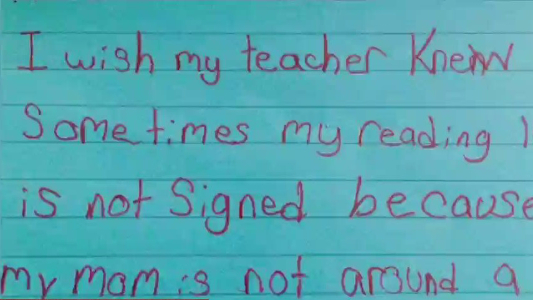It’s the simplest possible assignment, but it always teaches a huge lesson. Every year, Denver teacher Kyle Schwartz passes out Post-it notes to her third grade students and asks them to complete the sentence, “I wish my teacher knew …”
Many of the students she teaches at Doull Elementary just wish they had something in common with her, that she knew soccer or video games.
But sometimes, their wishes bring tears to her eyes, and offer a glimpse of painful struggles in their young lives.
There’s a student who misses her father: “I haven’t seen him in six years.”
Another who wants to tell her she’s lonely: “I don’t have friend to play with me.”
Still another who wants to explain why her reading log goes unsigned: “My mom is not around a lot.”
And other who has big hopes for the future: “I want to go to college.”
The assignment sprang from the kinds of conversations teachers have all the time, Schwartz said: “What do our students need? How can we best serve them?”
Schwartz always gives her students the option to write their names on their notes or remain anonymous; of sharing them only with her, or with the entire class. It surprises her how often students stand up and want to read their wishes out loud, like the shy student who shared, “I wish my teacher knew I’m nervous all the time.”
“They feel respected, they feel safe enough to share some of these more sensitive ones,” said Schwartz, who has been teaching for three years. “Kids can share what they feel comfortable with.”
Recently, Schwartz began to post some students’ responses on Twitter using the hashtag #IWishMyTeacherKnew. It spread, as teachers around the country tried it with their own classrooms.
They sometimes reveal what kids are most worried about right now, like the child whose mother was sick, or another who had just experienced bullying.
One student just wants more attention from the teacher.
Sometimes, they have a little fun: “I wish my teacher knew how to do a backflip.”
Occasionally, students want to reassure their teachers that that they’re doing a great job.
There’s a lot for teachers to learn, too: “They are KIDS who deal with a lot as they grow up,” one educator posted on Twitter.
Schwartz said she’s learned not to assume what her students wish. Although most of the students at her school live in poverty, not every message is about a material need.
There’s no pressure to share something they’re not ready to talk about, she said, and “they’re acutely aware of their own needs.”
Through assignments like this, she is, too. As her idea spread, many Twitter users asked how they can help to support her students. She’s pointed them toward a DonorsChoose.org fund where she posts a classroom project wish list.
So far, they’ve all been fulfilled.
